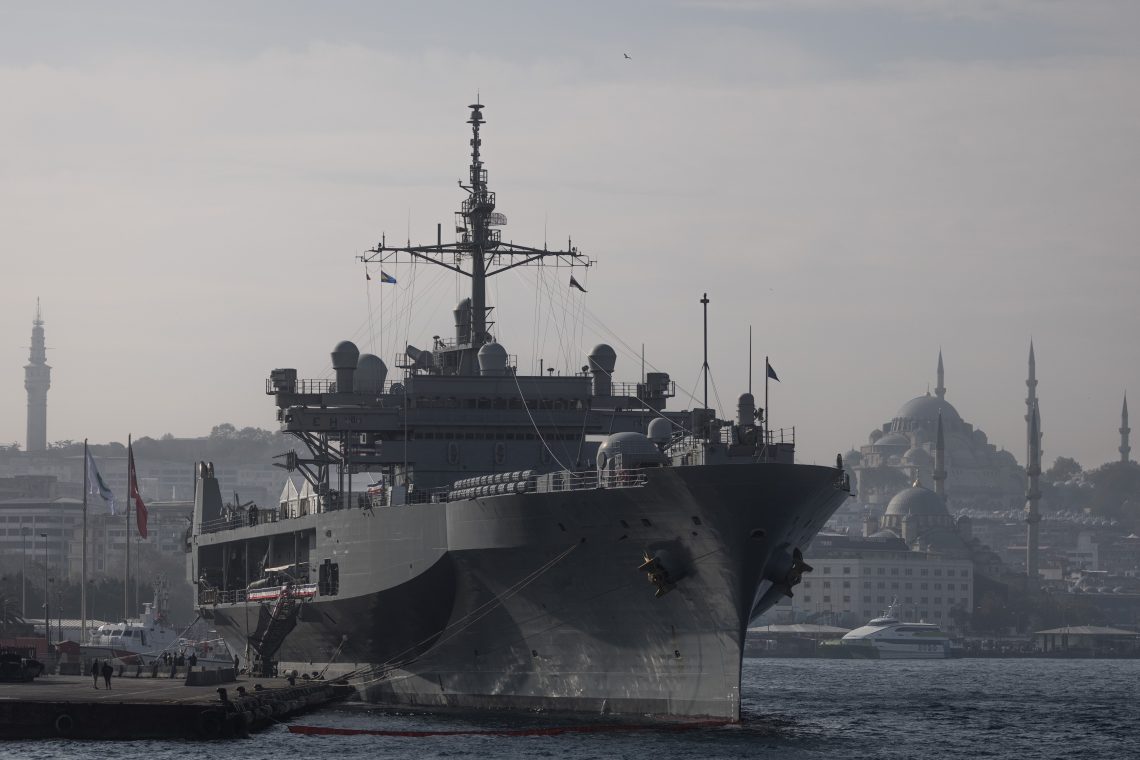The U.S. perspective on Black Sea security
American interests in a free and open Black Sea are enduring, but the level of engagement will be shaped by the war in Ukraine and the depth of the U.S. commitment to transatlantic security.

In a nutshell
- The Biden administration appreciates U.S. interests in the Black Sea
- A stalemate in Ukraine will necessitate sustained American engagement
- Presidential elections in November won’t dramatically shift the U.S. posture
Long an area of strategic interest, the Black Sea has not been a top-tier issue for the United States since the Allies considered invading the Balkans in 1943. Today, however, there is no doubt that Washington recognizes the value of a “free and open” Black Sea.
But whether the U.S. will be a strong supporter of regional initiatives to ensure freedom of navigation and the protection of maritime infrastructure is an open question. The level of American engagement over the medium term will largely be determined by the scope of the U.S.’s future commitment to transatlantic security and the outcome of Russia’s war against Ukraine.
Few new initiatives
The present U.S. administration clearly acknowledges the importance of a free and open Black Sea. The administration of President Joe Biden drafted a Black Sea strategy last year. In addition, the recent National Defense Authorization Act passed by Congress and signed by the president includes requirements for more attention to the Black Sea region.
The U.S. has also been supportive of efforts facilitating regional cooperation, including those meant to ensure the export of Ukrainian grain and joint demining operations on the Black Sea with Turkey, Romania and Bulgaria. The White House supported the development of regional defense plans that should serve to strengthen collective security on NATO’s southeastern flank, including around the Black Sea. In 2023, U.S. forces participated in NATO’s Operation Sea Breeze exercise, although American naval activities in the region overall have declined since Russia invaded and annexed Ukraine’s Crimean Peninsula in 2014.
Yet, beyond a concerted effort to sustain economic and military support for Ukraine and ongoing engagement with Poland and Romania, there are few new U.S. initiatives on regional security or transatlantic policy. Notably, the U.S. and Germany both declined to advocate Ukrainian membership at the July 2023 NATO summit in Vilnius, Lithuania, and there are few expectations that the White House will press for admitting Ukraine at the upcoming NATO summit in Washington in July. Indeed, neither the U.S. Black Sea strategy nor Congressional legislation has sparked dramatic new policy momentum. As Americans’ attention shifts to the upcoming national elections in November, that is not likely to change soon.
While the U.S. government is not indifferent, its efforts are more “bottom up” than “top down.” For instance, the chiefs of mission of American embassies in the region recently met to discuss cooperative efforts the State Department might propose to partner nations. Such modest initiatives are what is guiding U.S. policy development.
American priorities
Despite the apparent strategic lethargy, there are good reasons to expect U.S. interest in Black Sea security to remain strong.
Ukraine: A free and independent Ukraine will likely remain an important U.S. interest, as a block on Russia’s efforts to expand its sphere of control in Europe. This will hold regardless of the outcome of the November national elections. Access to the Black Sea is vital for the maintenance of an independent, secure and prosperous Ukraine and its postwar reconstruction.
NATO: The capability of NATO to provide collective defense for the transatlantic community is a vital U.S. interest. But in a war scenario, a free and open Black Sea, per se, is not vital to NATO’s southern flank; NATO forces have the capacity to dominate the Black Sea from the Mediterranean. Likely near-term threats impacting NATO security, however, do not come from a general war scenario. The concern instead is “gray zone” activities at the hands of Russia – such as mines, sabotage, corruption and political meddling – to interfere with freedom of navigation, commerce and infrastructure in the Black Sea region (e.g., pipelines, ports, drilling and pumping platforms).
Free and open spaces: The Black Sea is a pivot point in the pathways for trade, commerce, digital connectivity, energy and development to a multitude of regions, from North, Central and Southern Europe to the Mediterranean, the Middle East, North and East Africa, the Caucasus and Central Asia. A free and open Black Sea facilitates mutual security, stability and prosperity, serving as a buffer against malicious influence from Russia, China and Iran. These conditions greatly benefit both American security and prosperity.
Factors impacting future U.S. activity
Ukraine: Without question, the outcome of Russian military operations in Ukraine will shape future U.S. efforts in the Black Sea region. Under the most likely outcome of a stalemate, a free and open Black Sea will be vitally important for U.S. efforts to contain Russia and ensure the viability of Ukraine. Sustained U.S. interest is thus probable.
If Ukraine is defeated or loses access to the sea, the Black Sea region will become an economy-of-force issue for NATO – no longer viable as a lynchpin for NATO’s southern flank or as a connector for Eurasian transportation corridors.
U.S. elections: Dynamics in transatlantic security could shift based on the outcome of American national elections, in particular the presidential race. Regardless of who wins, the maintenance of NATO will remain a vital American interest. The debate in U.S. policy over a dramatic military “pivot to Asia” has largely run its course. While the Indo-Pacific will likely remain the highest-priority military theater, a U.S. presence will remain crucial in both Europe and the Middle East.
The reelection of President Joe Biden would most likely result in status quo policies on the Black Sea. A victory by a Republican candidate would not result in any dramatic diminishing of the NATO alliance. A Republican administration would be more apt to seek in a buildup of U.S. military forces and capability, but at the same time would likely be more sensitive to the prospect of deficit spending and its threat to the U.S. economy. Since every major American defense buildup has been financed through deficit spending, it remains to be seen how a Republican president will square these competing priorities.
A Republican administration will not be swayed by Russian efforts at either reproachment or intimidation. From a practical perspective, the Russian leadership lacks the capacity to sway NATO or the will to make serious conciliatory steps normalizing relations. There is a substantial recent history of U.S. presidents offering or seeking “resets” with the present Kremlin leadership. Each of them has been rebuffed, and there are few hopes that future efforts would be any more successful.

Furthermore, it is unlikely that a new president would risk enormous political capital on a deal with the Russians that could end up an embarrassing failure. A Republican president might well offer a negotiating package to Moscow as part of a Ukraine deal, or a more comprehensive package. But this would surely be a component of a larger regional strategy, one not predicated on Russian leaders responding responsibly.
A Republican president is likely to develop even closer and more sympathetic relations with North, Central and Southern European nations. These relationships are likely to result in greater willingness to partner in joint initiatives. Since U.S. allies in the region place a premium on a free and open Black Sea, Republican governance would emphasize the need for more joint cooperation.
Scenarios
Under no scenario would the U.S. press for a revision of the Montreux Convention, which regulates access to the Black Sea through the Turkish Straits and prevents escalation of naval clashes on the crucial waterway. Turkey would never accept changes; if the U.S. did press for such a course of action, it would risk a serious disruption of relations with Ankara.
Very likely: Continued focus on the Black Sea
The most likely scenario is that strategic stalemate in the Russian war against Ukraine compels a continued U.S. focus on the Black Sea, regardless of the outcome of November’s elections.
Under this scenario, either a Republican or Democratic administration will support initiatives for a free and open Black Sea. These initiatives will likely be in the following areas.
Capacity building: The U.S. will assist littoral nations in building their capabilities to ensure freedom of navigation in the Black Sea and protect critical infrastructure.
Cooperation: The more that littoral states work together, the more effectively they can expand the sphere of mutual security in the region. The U.S. will be a willing partner and supporter of joint planning, training and exercises.
Investment: The U.S. will continue to be supportive of investments to expand infrastructure capacity in the Black Sea region, extending to the Caucasus and the Middle Corridor. By bolstering trade and east-west transit through the Eastern Black Sea, Washington would offer concrete and productive alternatives to financing from China and Russia and their destabilizing and corrupting influence.
While a reelected President Biden would see continued implementation of the current approach to the region, a Republican administration is more likely to be a proactive partner with allies on Black Sea issues. This would be consistent with Republicans placing more attention on the Indo-Pacific while aiming to economize force in the transatlantic space – particularly where there are opportunities to work with willing partners.
For industry-specific scenarios and bespoke geopolitical intelligence, contact us and we will provide you with more information about our advisory services.








